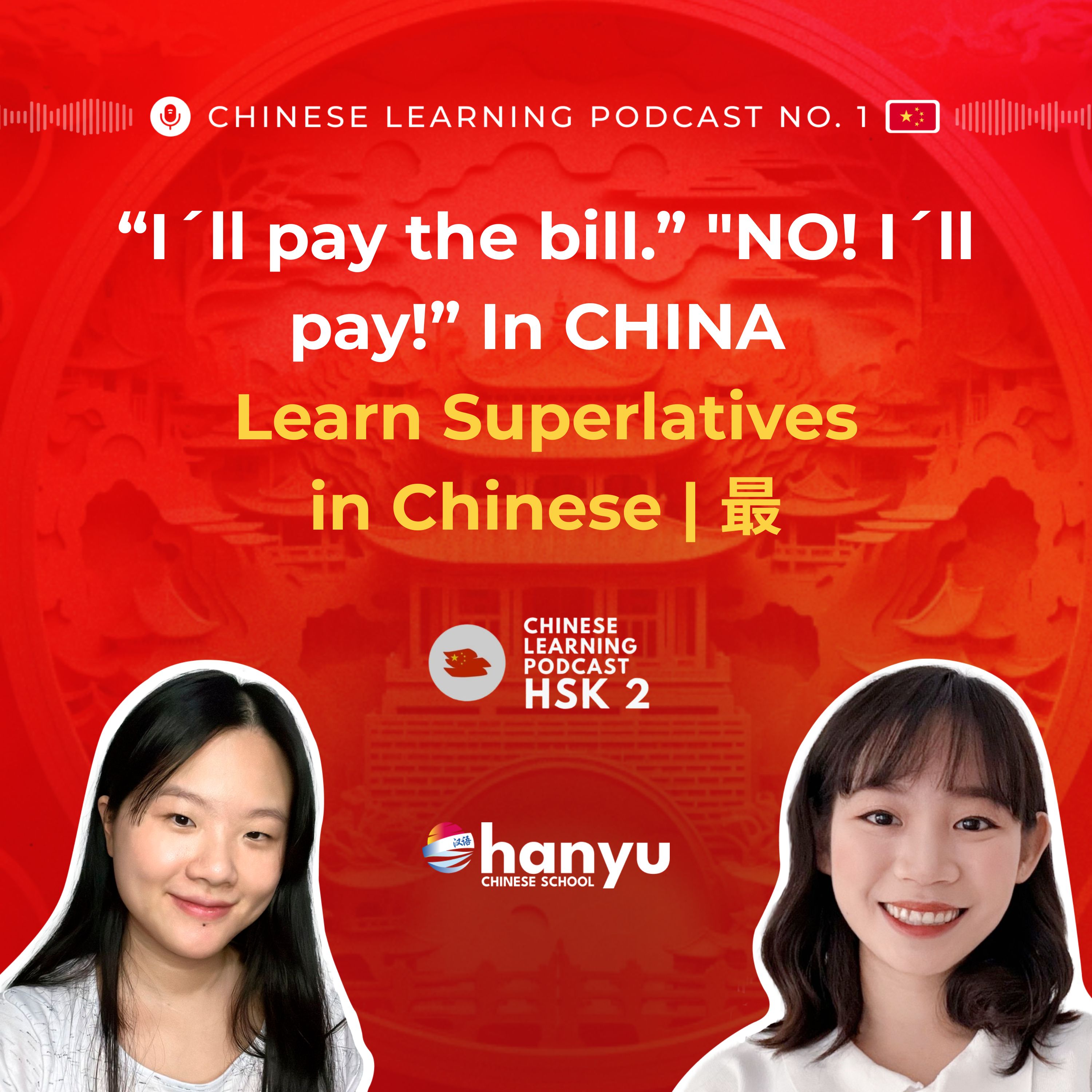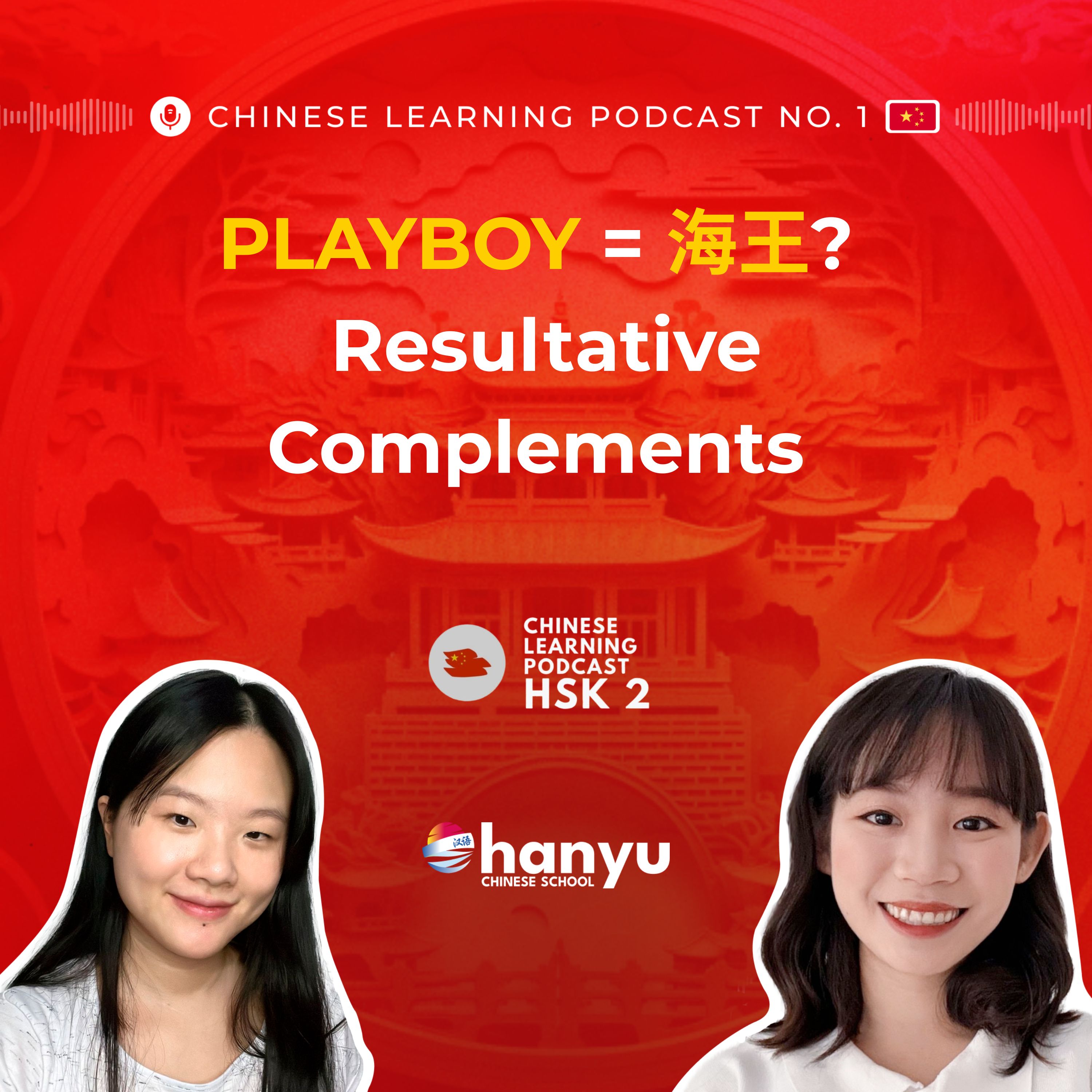Episode Transcript
[00:00:00] Speaker A: Foreign.
And welcome to the episode three of the HSK2 Chinese Master Podcast. I'm Emily, and today I am with our lovely Vicki.
[00:00:23] Speaker B: Hi, everyone. I'm so glad you guys are here. Today episode, we are going to talk a very frequent particle in Chinese, which is the word.
[00:00:36] Speaker A: That's right. It's tiny, but it makes big difference in how you sound.
We'll show you how to use and make your sentence sound like, more friendlier and more natural, more local.
[00:00:50] Speaker B: Yes. And later in our cultural segment, we're gonna talk about the phrase yo kun, which means to have free time, but not always. It means that.
I mean, it doesn't mean that everyone wants to go out with you or meet with you.
[00:01:12] Speaker A: Exactly. So that's the tricky part about our culture. And so stick around. By the end of today's episode, you will not only use ba, like native, but also you will understand some of the hidden rules in the society in China.
[00:01:33] Speaker B: Yes.
So we're gonna continue with a dialogue.
[00:01:41] Speaker A: So let's start with a short one.
So the scenario setting is two colleges chatting on a Friday afternoon. So listen closely for the different ways that we use.
[00:01:57] Speaker B: So I'm going to start.
[00:02:30] Speaker A: Okay.
[00:02:31] Speaker B: In this short conversation, we use PA in different ways, such as to make polite suggestions, to agree with hesitation, or to offer something in a very friendly way.
[00:02:50] Speaker A: So for grammar, let's take a closer look at this. Small word appears at the end of many sentences, but its function depends on the tone and the context.
So let's see first about the grammar, the structure. The first use is for apply, suggestion or invitation.
The structure is subject verb in the end.
So it softens your tone and makes it sound more like a gentle proposal.
Can Vicky help us read the example that we had from our dialogue?
[00:03:33] Speaker B: Yeah, of course.
Shall we have dinner together this weekend?
[00:03:46] Speaker A: Thank you so much. So it sets here for polite suggestion or invitation. Right.
Next we have other examples.
For example, let's go.
Or study Chinese today.
[00:04:09] Speaker B: Yes. So instead of sounding like you're giving orders, but makes the sentence sounds like, how about shall we?
[00:04:21] Speaker A: Exactly. And so we have a second condition. The second use of is seeking confirmation.
So when you're almost sure about something.
So the structure is statement, statement first, and then also in the end, use when you believe in something that is true, but you're checking it politely. So can Vicki help us read the example again?
[00:04:58] Speaker B: Your British, right?
And he's not coming today, is he?
[00:05:11] Speaker A: So this is great for small talk and soft questions, especially when you don't want to sound too, too.
Okay, so Here we have this third use for ba. It is mean about accepting or agreeing.
The structure.
Well, the structure.
It's more about memory. Memorizing. No, because it's not a big sentence. So let's see it. We had.
So can Vicki help us read out the example, please?
[00:05:59] Speaker B: Yes, all right. But I might arrive a bit later.
[00:06:12] Speaker A: Thank you so much.
So we have other example. For example, like. All right, I'll go.
Second one is fine. I'll do it. So this really, really depends from context to contest, right, Vicky? Because depends on your tone. You can feel like happy. You can feel like, ah, I don't want to, you know.
[00:06:42] Speaker B: Yeah, yeah. So if someone invites you to karaoke and you are not in the mood, but you say howa. It means that you agree, but it's like you actually don't want to go.
[00:06:56] Speaker A: Yeah. If you say like, for example, you say and how.
Really a big difference. So through the texting, you can't really tell, but when you're talking like person to person, it's so obvious.
[00:07:18] Speaker B: Yeah, I mean, you.
You need to pay attention how their expressions are.
And because it's a very usual word in daily Chinese, so you need to mask. You need to understand all the ways of use of pa.
[00:07:43] Speaker A: Exactly. And other tip is that in written Chinese or former formal situations, it's like it's not common to use.
This is only for spoken Mandarin. It's everywhere.
But like it makes your.
It makes your sentence. It reflects the tone of the speaker. Like gentle, polite, or flexible.
But just to be be clear that we don't really use this when you're writing a formal. Formal document or using in the test.
[00:08:22] Speaker B: Yes.
So now we're gonna continue for our question for our audience.
[00:08:33] Speaker A: Okay, so here's the challenge for today.
How would you say in Chinese, let's go watch a movie together?
How do you say this?
[00:08:44] Speaker B: Try to use the grammar we have just learned and also add the word itzy, which means together. And then at the end add.
So see how you can do this sentence.
[00:09:00] Speaker A: So think about it for a second. Write your answer in the comment section down below. We're really happy to review it to see what you have.
Okay, so now we are going to review a little bit about our dialogue.
So let's take a look back at the dialogue here first.
Okay, so we're gonna read it together and then also we're gonna translate it.
[00:09:32] Speaker B: So shall we have dinner together? This.
[00:09:46] Speaker A: I'm free this weekend, but I might need to help a friend to move.
[00:10:02] Speaker B: Then let's meet on Sunday, shall we?
[00:10:12] Speaker A: Alright. But I might arrive a little bit late.
[00:10:20] Speaker B: No problem. Let's go for a coffee, shall we?
[00:10:29] Speaker A: Coffee sounds good. I'll treat you.
[00:10:32] Speaker B: Thank you.
I'm waiting for that coffee.
[00:10:39] Speaker A: True, true, true. I'm gonna. Gonna.
Oh, thank you. Thank you.
Okay, so perfect. So we see the lesson review already.
If you understand.
Perfect. If you didn't, of course you can review the whole grammar and the whole lesson again. So listen to our podcast again as many times as you need it.
[00:11:11] Speaker B: Yes. And if you're.
If you have friends that are learning Chinese too, don't forget to share this today's episode and to give us a like and subscribe, we can learn together.
[00:11:28] Speaker A: Exactly.
And also we have, we have our podcast in each different kind of platform. We have Spotify, Apple Podcasts, YouTube, you can use with whichever platform that suits you better. And feel free to leave us a like or subscribe us in any kinds of platform.
And furthermore, please check out our hany chinese school.com, our website for free trial lesson.
Yes.
[00:12:03] Speaker B: Let's continue.
So today in our cultural section, we're gonna talk about the phrase yo kung, which means have free time.
[00:12:20] Speaker A: Yes. So you might think that it's a simple way to say, ah, I'm free. But things aren't always that straightforward, especially in Asian culture. Right?
[00:12:33] Speaker B: Yeah.
For example, let's say you invite someone out and they reply, oh, let's talk again when I'm free.
[00:12:46] Speaker A: Yeah. So like this, you don't, you don't really see the end of it. Like probably never.
So it sounds soft, right? But in many cases it actually means no.
[00:13:02] Speaker B: Yes, exactly. I mean, in Chinese culture, people often avoid to say no directly, you know, because they want to be polite.
So first is like, it's like, I'm a bit busy lately or well, Kang Khan, I'll take a look.
Are often polite ways to say I'm not interested. Maybe not now. Like, no, basically.
[00:13:36] Speaker A: Exactly. Like I, I could understand. Like I do this.
I wouldn't say a lot, but I, I do do this.
Oh, I mean, yeah, like I don't want to sound too rude and I'm just. We're just not that used to say no directly. We're always like, yeah, we'll, we'll look about that. We'll see about that. Woman, Woman, I'll message you. But like you will never really risk get that message, like ever.
[00:14:19] Speaker B: Yeah, I mean, especially when you say we'll see when the times comes, never comes. So forget about it.
[00:14:32] Speaker A: Probably 10 years after. And then we'll have the time, you know. Yeah, yeah, yeah, yeah.
Exactly. So. Oh, so of course not always. Sometimes people are really busy.
So like it depends from person to person. Depends on the timing, depends on content.
So how can you really tell the difference?
[00:14:59] Speaker B: Well, simple. If the person give you a specific time, date or activity, they really want to hang out or do things.
But if they say oh yo kun without any details, it means that no, you're probably gonna not meet each other.
[00:15:19] Speaker A: Exactly. Like I think in.
Of course for us, we normally the thing is what we do is like oh, I'm not free this.
Like if I give you like more specific details further for really arranging the next one, I feel like this is a cultural thing like we do and then you can understand. Oh, like, like this person really, really do want to arrange things with me, right?
[00:15:56] Speaker B: Yeah. I mean you really need to read between lines and of course see their expressions.
[00:16:05] Speaker A: If you cannot see the expression, you are just messaging each one another.
I the other tip. Like the other trick that I use is, I use is that I if someone says like oh yokong Kang Kan, then I would like probably message one or two more further details.
And then if the person is still like then I would understand.
[00:16:37] Speaker B: Yeah.
So now let's move on to our answer that we have just asked our audience.
So how would you say let's go watch a movie together.
[00:16:57] Speaker A: So the answer is let's go watch a movie together.
[00:17:06] Speaker B: Yes. It's a perfect use of IQI and PA at the end to soften the sentence.
[00:17:18] Speaker A: So great job if you get it right. If not, don't worry, you will have time to review and to try again.
So let's take a look at the answer. Yeah. So we use in the end and we have the person and then we put after the subject.
[00:17:40] Speaker B: Yes.
[00:17:43] Speaker A: Okay, so right now it's your turn for the homework challenge.
[00:17:49] Speaker B: Make a sentence using yes, write a sentence using pa. In our comments, you can either try making a suggestion or asking someone politely something or agreeing something.
We will see all the answers there.
[00:18:12] Speaker A: Exactly. And if you need any inspiration, try something like let's study together tomorrow or alright, I'll go with your idea. Something like this.
[00:18:30] Speaker B: Yeah. Don't be shy. We'll give you feedback.
[00:18:39] Speaker A: So what have we learned today, Vicky?
[00:18:43] Speaker B: So today we learned the word pa. The different uses of pa we can either make suggestion, we can even agree someone or the point of PA is to make the sentence sounds soft and natural.
What else we have learned?
[00:19:08] Speaker A: The other one is our culture highlight. Talking about yokong like yokong.
Yeah. Not really? Always a yes, sometimes a no.
So depends. Depends.
[00:19:26] Speaker B: Yeah.
So in our next episode, we're gonna explore a very fun few future of spoken Chinese.
The reduplication like Kankan, Tintin why Chinese people like to repeat their verbs. What does it really means?
[00:19:50] Speaker A: So don't miss it. And if you want to keep learning with this, head to our website class, get a free resource and see what our students why our students love studying with us.
[00:20:06] Speaker B: Yes. And if you like today's episode, don't forget to give us a like or even subscribe.
We'll see you in the next episode.
[00:20:17] Speaker A: Yes. Thank you guys so much.
[00:20:26] Speaker B: Sa.


